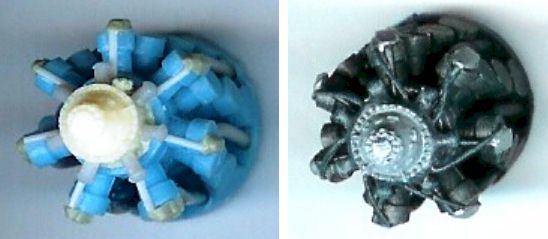Special Hobby 1/72 Goodyear F2G-2
by Mark Davies
The Goodyear F2G was a development of the Vought F4U Corsair using the Pratt & Whitney R-4360 four-row ”corncob” radial engine, cut-down fuselage and bubble canopy. It was intended as a low to medium altitude interceptor, and for its day had a phenomenal rate of climb employing the 3,000 hp of its engine. However it suffered from some lateral stability problems and only a few were built by the end of World War II. Some went on to be raced with considerable success, and I believe that one is still racing today.
The Special Hobby kit is a delightful rendition of this lesser-known version of the Corsair with excellent surface detail, resin cockpit interior, wheel wells and engine, oil coolers, exhaust stubs and zero-length rocket launchers, plus etched seat belts and instrument panels, a 2 vac-form canopies and three decal choices. All this cost me NZ$20.00 (about US$13.00) – Now that’s what I call value!
Unfortunately the engine is a Pratt & Whitney R-2800, which is an 18 cylinder two-row engine, whereas the F2G’s engine was a 28 cylinder 4-rower. I think that Engines & Things offer a P&W R-4360, but because this model was intended as a two-week build (I’m into volume, aiming at 12-16 models finished a year), I opted to cobble something together from spares. I used four 7-cylinder rows of Airfix SM 79 engines and the reduction gear housing of the kit’s resin engine plus some scrap details to come up with my model’s R4360. See the results below!
Before painting, and after…
After that it was a straight forward build with no significant difficulties. The oil coolers are a bit tricky to cut from their casting blocks, and require a little filler. The canopy edges are quite thick, and needed chamfering to sit nicely over the curve of the fuselage.
I replaced the kit’s resin head-rest brace with plastic rod, and used the tail-wheel from an Academy F4U-1 as the Special Hobby wheel was the only part of the kit that wasn’t crisply moulded.
The kit was painted with Gunze acrylics and had a fair bit of weathering added by airbrush, pastels and silver pencil. I did this because the photos I used for references showed the aircraft to be heavily exhaust stained and scuffed by boots, which surprised me for a post-war aircraft.
I enjoyed the build a lot. This is a very good limited run kit, and the incorrect engine is a minor hassle only.
This article was originally published in IPMS Stockholm Magazine in May 2004.




